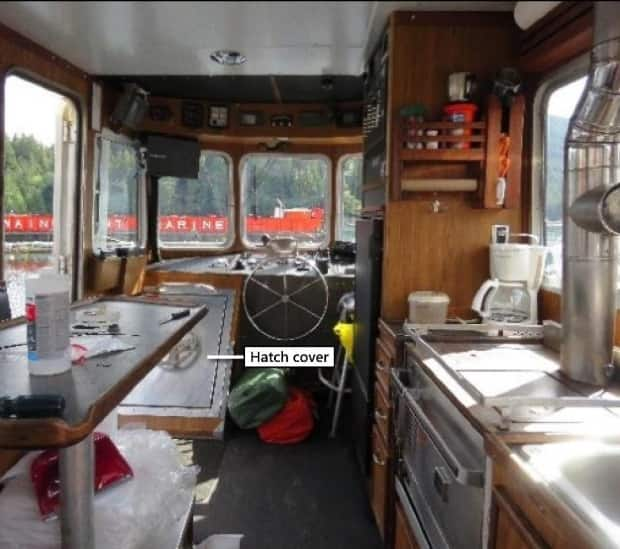Families of crew members who died in tug sinking in B.C. vow to fight for change

The Transportation Safety Board has recommended that Transport Canada start regularly inspecting smaller tug boats, among other recommendations, after an investigation into a deadly sinking on B.C.'s North Coast found such vessels can go largely unchecked for most of their functioning life — if they are checked at all.
Troy Pearson, the 58-year-old pilot, and 25-year-old crew member Charley Cragg died in the water after the tug Ingenika sank in February 2021. A third crewman made it to the life raft and was rescued hours later.
Family members of the two men who died are pushing for federal government action, with one calling the accident "100 per cent preventable."
A statement from the board on Wednesday said it couldn't find records showing the tug that capsized in a narrow ocean channel south of Kitimat, B.C., in 2021 had ever been inspected by the agency in its 50 years on the water — a potentially common scenario for such vessels, since Transport Canada does not currently certify or require regular inspections for tugs weighing 15 gross tonnes or less.
"Most [of these vessels] will go years between inspections, or will never be inspected," Transportation Safety Board chair Kathy Fox said during a news conference Wednesday.
The recommendation is one of four put forward after the board investigated the sinking of the Ingenika in the Gardner Canal on Feb. 10, 2021.
The tug, owned by Wainwright Marine Services, was towing a barge in a narrow channel off Europa Point when poor weather affected its ability to tow and maintain speed.
Its captain and two crew members were aboard when it took on water and sank. All three crewmen were able to escape, but only one was able to swim and climb aboard a life raft.
A search and rescue operation recovered the bodies of Pearson and Cragg.
The board said Cragg had started with the company that day and the trip was his first time on a tug. The surviving deckhand got him familiar with the ship, the board said, but didn't practise for an emergency.
"While [crew] may have been shown the location of life-saving equipment, there wasn't a drill performed to practise donning the lifesaving equipment and our investigation found that this was somewhat of a normal practice on the vessel," said Clifford Harvey, the TSB's director of marine investigations.

Crew weighed down by partially zipped immersion suits: report
Investigators said Pearson and Cragg drowned because they were weighed down by immersion suits that were only partially done up. A suit that isn't fully zipped with the hood up can take on water, restricting movement and increasing the chance of hypothermia.
The survivor was able to swim to the raft because he hadn't had time to put his suit on before abandoning ship, the board said. He was hospitalized for hypothermia and frostbite after being rescued.
Fox said the board has investigated six incidents involving similar-sized tugs since 2015. Systemic safety issues have been on the board's safety watchlist for more than a decade.
Its recommendations Wednesday included that owners and operators should assess risks adequately and that the Pacific Pilotage Authority, the Crown corporation that maintains safe pilot service in B.C.'s coastal waters, should ensure only qualified crew members are allowed to pilot a vessel.
Cragg's mother, Genevieve Cragg, said the accident was "100 per cent predictable and 100 per cent preventable.''
"Charley and Troy paid the highest price with their lives to make change happen. These recommendations announced today by the board are critical and cannot afford any further delay,'' she said.
Judy Carlick-Pearson, Troy Pearson's widow, said there's plenty of blame to go around, but the families have to continue to fight for change.
"[We] fight for the survivors that are out there that are risking their lives to go on the waters, fight for change. Make sure these recommendations are put in place that protect your loved ones,'' she said.
In a statement, Federal Transport Minister Omar Alghabra said he would formally respond to the board's recommendations within 90 days.
"Our hearts go out to the family members and loved ones of the crew members who lost their lives or were injured due to the sinking," he wrote.
"I want to thank the Transportation Safety Board of Canada for their work in conducting the investigation and publishing its report. I share their commitment to advancing the safety of Canada's transportation system, and I am committed to working with partners to further enhance Canada's marine safety system."
The barge towed by the Ingenika was found not far from the site of the sinking. The tug, which had 3,500 litres of diesel fuel in its tanks, has never been recovered after sinking in roughly 200 metres of water.
Charges under the Workers Compensation Act were laid last month against Wainwright Marine Services and one of its senior officials, alleging violations of occupational health and safety regulations.


